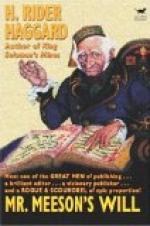“Oh, no, I should not,” answered Eustace; “I’ve quite made up my mind. Let them stick to their mesne” (here James made a face); “Well, then, to their middle or intermediate or their anything else profits. No appeals for me, if I can avoid it. Send News a telegram.”
“That,” began James, in his most solemn and legal tones, “is a view of the matter in which I am glad to be able to heartily coincide, although it seems to me that there are several points, which I will touch on one by one.”
“Good gracious! no,” broke in Lady Holmhurst; “but I think it is rather mean of them, don’t you, Mr. Short?”
James looked puzzled. “I do not quite take Lady Holmhurst’s point,” he said plaintively.
“Then you must be stupid,” said Eustace, “Don’t you see the joke?—’mesne profits,’ mean of them?”
“Ah,” said James, with satisfaction; “I perceive. Lady Holmhurst does not seem to be aware that although ’mesne’—a totally erroneous word—is pronounced ‘mean,’ it is spelt m-e-s-n-e.”
“I stand corrected,” said Lady Holmhurst, with a little curtsey. “I thought that Mr. James Short would take my ignorance into account, and understand what I mean!”
This atrocious pun turned the laugh against the learned James, and then, the telegram to News and News having been dispatched, they all went in to the wedding breakfast.
In a general way, wedding breakfasts are not particularly lively affairs. There is a mock hilarity about them that does not tend to true cheerfulness, and those of the guests who are not occupied with graver thoughts are probably thinking of the dyspepsia that comes after. But this particular breakfast was an exception. For the first time since her husband’s unfortunate death, Lady Holmhurst seemed to have entirely recovered her spirits and was her old self, and a very charming self it was, so charming, indeed, that even James forgot his learning and the responsibilities of his noble profession and talked, like an ordinary Christian. Indeed, he even went so far as to pay her an elephantine compliment; but as it was three sentences long, and divided into points, it shall not be repeated here.
And then, at length, Dr. Probate rose to propose the bride’s health; and very nicely he did it, as might have been expected from a man with his extraordinary familiarity with matrimonial affairs. His speech was quite charming, and aptly sprinkled with classical quotations.
“I have often,” he ended, “heard it advanced that all men are in reality equally favoured by the Fates in their passage through the world. I have always doubted the truth of that assertion, and now I am convinced of its falsity. Mr. Eustace is a very excellent young man, and, if I may be allowed to say so, a very good-looking young man; but what, I would ask this assembled company, has Mr. Meeson done above the rest of men to justify his supreme good fortune? Why should this young gentleman




